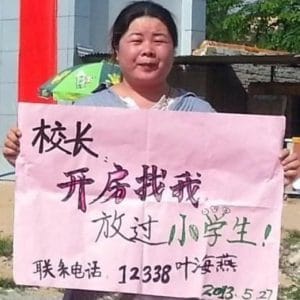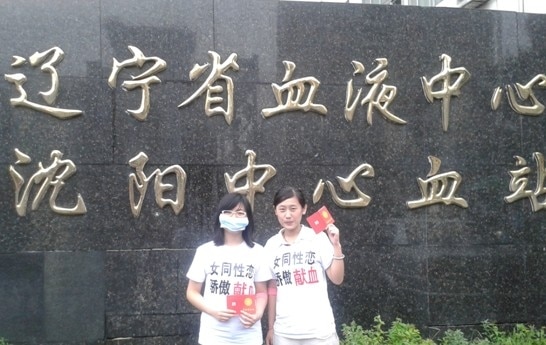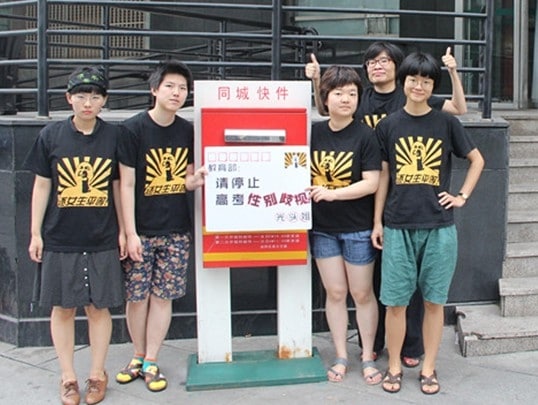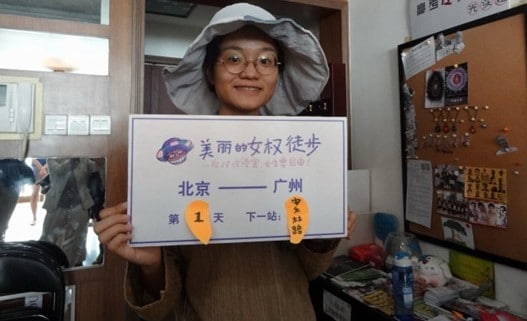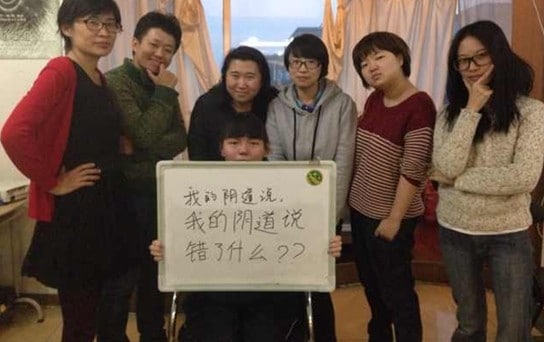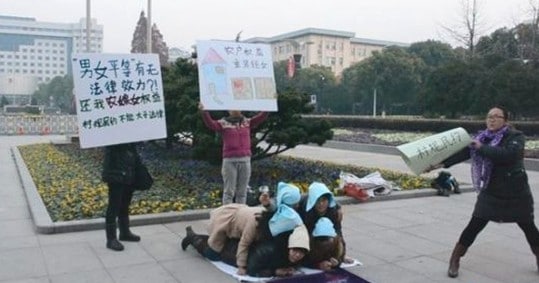Introduction
At the beginning of the new year, we remember the voices of the women who were even braver than in the past. We recall every episode but all are actually connected in the hearts of those who struggle for women’s rights. Although all the women who are praised here are pioneers — college students, lesbians, lawyers, workers, rural women — they are working together, and gaining more supporters. Because they do not accept the postponement of their rights, they grasp every moment, for themselves, for strangers, and also for this society. Perhaps the fact they are making history is only now beginning to get recognition.
We are glad to be on the scene when we can, and when we are unable to be there in person we can still bring attention to them. The show is just beginning, but the programs and chorus are insufficient, and we await the audience’s participation.
1) “I do not want to become a Li Yan”: To quickly provide life-saving care to women suffering from abusive husbands
After the 2013 Spring Festival, the life and death situation of Li Yan [李彦], a Sichuanese woman who was abused by her husband, caught the attention of women’s rights supporters across the country. Li Yan was a laid-off worker from the city of Ziyang [资阳] in Anyue [安岳] county. Because she could not stand being abused, she killed her husband Tan Yong in December of 2010. However, because her abuse was not recognized by the court, Li Yan was charged with murder and sentenced to death. On January 24th, Li Yan’s family believed that the Supreme People’s Court had already authorized the death sentence and that her death was imminent. People from all walks of life immediately took action to save Li Yan; on January 25th, an open letter signed by 136 people posted on the internet called on people to save her life. On January 28th, volunteers visited the Number Two High People’s Court of Sichuan and delivered an urgent letter of appeal with signatures from over 200 women’s rights supporters. On February 3rd, volunteers in Guangzhou, Shanghai, Wuhan, Beijing, and Xian held performances of a piece called “I do not want to be the next Li Yan” in front of eight courthouses. Behind the scenes, the Anti-Domestic Violence Network (反对家庭暴力网络) (Beijing Fanbao, 北京帆葆) worked hard to mobilize various departments and individuals connected to the case. On the international front, the well-known human rights group Amnesty International also asked China not to execute victims of domestic violence.
The Li Yan case once again causes society to take seriously the tragic phenomenon of abusive husbands. It also illustrates that for cases of this kind the utilization of the death penalty is not in line with public opinion. As of March 2013, the Supreme People’s Court is reconsidering Li Yan’s death penalty. A public interest lawyer is once again investigating the case, and providing new evidence of Li Yan’s abuse. The case has been adjourned until now, and every observer hopes that the court will ultimately give a fair sentence.
2) “Zero tolerance for domestic violence”: The outcome of the Li Yang case recognizes domestic violence
The public announcement of Kim’s divorce from Li Yang [李阳] came on February 3, 2013. The founder of “Crazy English,” multimillionaire Li Yang, was found guilty of domestic abuse and was ordered to pay his American wife Kim fifty thousand yuan as compensation for psychological harm. He was also given a restraining order so that he could no longer threaten or harass her.
In September 2011, Kim exposed Li Yang’s abuse on the internet; in November she filed for divorce. This has been the most widely publicized case of domestic violence in recent years. Kim’s case sets an important precedent because despite undergoing hardship she ultimately achieved a moral victory, a court sentencing, and Beijing’s first-ever public restraining order for domestic violence.
Kim has collaborated with women’s organizations to spread awareness of domestic violence. In an open letter, she wrote, “Ignoring domestic violence in the name of ‘harmonious family’ ultimately means that the next generation of families will suffer the same fate. In the event that the law is insufficient, the most effective tactic is to aggressively campaign against the public’s tolerance of domestic violence in order to reach this shared understanding: domestic violence is not a part of culture, it is a crime!”
Grassroots women’s organizations and volunteers staunchly supported Kim. From June 2012 to February 2013, volunteers in Beijing, Nanjing, and Guangzhou launched five public demonstrations against Li Yang, stating that they have zero tolerance for domestic violence. Kim said, “The eloquence, poise, and bravery of these volunteers has been incredible.”
3) “Get a room with me, leave the elementary students alone”: Anti-sexual assault protest in Hainan
In early May of 2013, what was called the “Headmaster Hotel Case” was brought to light in Wanning, Hainan. The principal of the No. 2 Elementary School, Chen Moupeng [陈某鹏], and Housing Authority staff member, Feng Mousong [冯某松], took six female boarding students to a hotel, inciting intense resentment from society. However, as the case moved from public charges to the court of law, public interest waned, causing concern as to whether the case would reach a fair outcome.
At this precarious juncture, on May 27th feminist activist Ye Haiyan held up a sign outside of Wanning No.2 Elementary School: “To the principal: get a room with me, let go of those elementary school students!” The picture went viral on the internet, and netizens also submitted similar photos of themselves. The media followed up on this story, renewing attention to the case at a time when coverage was waning.
However, following this, Ye Haiyan was sexually harassed, taken into custody, and banished. In response, Professor Ai Xiaoming [of Sun Yatsen University] put up a photo of herself holding the sign “Get a room with me, let go of Ye Haiyin.” Feminist volunteers also organized a postcard solidarity campaign. Although Chen Moupeng and Feng Mouson were found guilty of rape, the Department of Education has not yet been held responsible. Meanwhile, the victims have been under enormous pressure, facing many difficulties at school.
Because of this case, the sexual assault of young girls became one of the most widely discussed crimes of 2013. Ye Haiyan protested on behalf of countless people. The victims of this case suffered tremendously, but in the last half of the year the Supreme People’s Court and relavent government bodies officially released guidelines on how to deal with such cases, showing that those in power cannot avoid responding to the voice of the people.
4) “Lesbians proudly give blood”: Publicly commemorating the end of the prohibition of lesbians donating blood
On July 1, 2013, two young women braved the rain to get to the Shenyang blood donation center, each donating 200 cc of blood and probably becoming China’s earliest instance of gay women receiving a blood donation certificate. On this day, to commemorate the first anniversary of the lifting of the prohibition of lesbians donating blood, gay women also publicly donated blood in Beijing, Guangzhou, Wuhan, and Zhengzhou.
According to the Ministry of Health’s ‘Health Requirements for Blood Donors’ [献血者健康检查要求], prior to July 2012 blood donors had to fill out a form that contained a question about whether the potential donor was gay. Anyone who declared that he or she was gay was prohibited from donating blood. Gay rights groups and experts protested that this policy discriminated against gay people, drawing attention to the lack of scientific basis and pointing out that gay women in particular rarely transmit AIDs and other diseases. On July 1, 2012, the updated Health Requirements were implemented, specifying that only male blood donors were asked whether they have had homosexual intercourse. This lifted the restrictions placed on gay women and rejected the wholesale discrimination against homosexuals.
The ending of the prohibition against lesbians donating blood is an important step in ending discrimination based on sexual orientation. Marking the anniversary of the lifting of the ban, the “lesbians proudly donating” event symbolizes how lesbians are becoming regarded as full citizens. It is also a testament to the organizing capabilities of the volunteers.
5) “Discrimination is not OK just because it is common”: Denouncing discriminatory admissions practices at elite schools
On the first day of school, September 1, 2013, five female students sent a jointly signed letter, denouncing the practice of blatantly discriminating against female applicants at many of the country’s top universities. On the same day, 11 female lawyers requested that the Ministry of Education publicly release information about gender discrimination practices at elite schools. They also asked the Ministry of Education about the measures they were taking regarding this practice.
The sex discrimination practices were exposed in the 2012 college entrance examination season. Numerous excuses were employed to justify the reduction of opportunities for equal education. From the beginning of that summer, women’s rights activists used various tactics to continue public discussion and hold the institutions accountable. Finally, in May 2013 the Ministry of Education responded indirectly through its Provisions of University Admissions Practices of 2013. While excluding the military, national defense, and public security institutions, the new regulations prohibited all other schools from setting sex-based admissions quotas. Nevertheless, the Media Monitor for Women Network’s [妇女传媒监测网络] 2013 Report on ‘Project 211 Engineering’ Schools’ Sex-based Discriminatory Admissions Practices [2013年“211工程”学校招生性别歧视报告] illustrates that of the 112 Project 211 engineering schools, 66% practice sex discrimination. Therefore feminist students and lawyers suspect that the Ministry of Education failed to do its job. They hope that denouncing them and pushing them to publicly release their policies will raise awareness of the issues and promote the design of non-discriminatory regulations.
The Ministry of Education did not pay attention to the activists’ suggestions and had only vague responses to the requests to make their information public. The Ministry of Education, using the Xinhua news agency as their spokesperson, claimed that sex-based admissions quotas were not discriminatory. However, discrimination cannot be rationalized just because it is a common practice. For the sake of equal access to educational opportunities, activists will continue to fight.
6) “This is not just a one-time publicity stunt”: Meili’s Feminist March begins
“This march is a very long gamble. It is not just a one-time publicity stunt. When we walk on this earth, the tension between a cruel society’s oppression of women and women’s resistance is in each step.” On January 15, 2013, Xiao Meili set out on a journey from Beijing’s Yiyuan Commune, outside of the northern side of the second ring road wearing the slogan, “Fight sexual assault, girls want freedom,” taking the first step of her 2200 kilometer journey to Guangzhou.
Since 2012, Xiao Meili, a frequent participant in feminist activism, has hoped that the Girls’ Long March can push society towards taking sexual assault on school campuses more seriously and creating a basic awareness of gender equality. Additionally, while on the walk, Xiao has been using information disclosure applications and proposals to push local governments to improve their measures for preventing and addressing sexual assault. She hopes to walk with partners from start to finish of her three-month journey through Beijing, Hebei, Henan, Hubei, Hunan, and Guangdong. The march will be funded by small donations from supporters.
By the beginning of January 2014, Xiao Meili had already passed Yueyang, Hunan, having already covered approximately 1,400 kilometers. Along the way, she had already collected close to 2,000 signatures, handed in 100 proposals and information disclosure applications and conducted more than ten public talks. She was met with both doubt and indifference, and she got little attention from local governments. They did not respond to either her applications or proposals. However, the local residents she met on the way gave her a great deal of encouragement and support, and her story has received much media coverage.
Meili’s feminist march is both an experimental form of consciousness-raising and advocacy work, as well as a form of self-cultivation for young feminists, as well as a journey that has deepened her conviction, step by step. Xiao Meili plans to arrive in Guangzhou in early March and hold an exhibition on the project.
7) “Do not think of me as a bad word”: Photographs of “What My Vagina Says”
On October 31, 2013, 17 Beijing Foreign Studies University students from the Gender Action Group [北外性别行动小组] posted a series of pictures called ‘My Vagina Says’. These included: “My Vagina Says: I want freedom,” “My Vagina Says: I want respect,” and “My vagina says: do not treat me like a bad word.” The goal was to advertise the upcoming performance of their play The Way of the Vagina (阴道之道) [inspired by “The Vagina Monologues”].
The photos went viral, followed by a deluge of criticism and even abusive insults. Told that they were offending public morals, the female students of BFSU came under enormous pressure. The original creators of the The Way of the Vagina, Beijing group Bcome and the Women’s Voice microblog, quickly responded. Through various methods such as news interviews, discussion, and online discussion they expounded the ideas behind The Way of the Vagina—women’s autonomy and right to public expression—and criticized the violent culture of controlling and oppressing women.
With the goal of protesting against gender violence and advocating women’s sexual liberty and pleasure, the play has already entered its eleventh year in China. The commotion surrounding My Vagina Says comes from Chinese society’s extreme fear, even now, of women talking about sex. The college students encountered unexpected obstacles, and have been forced to expend a great deal of energy to defend the project. Professor Ai Xiaoming remarked, “Patriarchal culture has a long history, is extremely unyielding, and has not been challenged nearly enough. My Vagina Says allows the patriarchy to realize that behind the vagina is a mind. The fact that the play has been met with so much disgust shows that it has challenged patriarchy successfully.”
8 ) “Monitoring sexual harassment”: Shenzhen and Guangdong labor organizations release research reports
On November 21, 2013, the Shenzhen-based Hand in Hand Workers’ Activity Space [手牵手工友活动室] released “Monitoring Sexual Harassment: A Public Interest Report on the Sexual Harassment of Female Factory Workers,” revealing that 70% of factory women surveyed had experienced various degrees of sexual harassment. Over 60% of the perpetrators were from the same work group or adjacent work group. Over 65% percent of the interviewees used various measures to resist sexual harassment, but 46% of cases were not clearly resolved. On the 25th, the Guangzhou Sunflower Female Worker’s Center [阳花女工中心] also released a report about sexual harassment in the work place in Guangzhou with similar findings.
China’s recent dependence on rapid economic growth, driven by its position as the “factory for the world”, deprives numerous people of their rights. This is a reality that everyone is already aware of. However, because the oppression of female workers goes largely unseen, the reports by the two labor organizations offer an important new look at the problem. They give a grassroots prospective of sexual harassment in the factory workplace and provide an important reminder that female workers are doubly vulnerable because of both class and gender. The voices of female workers for this year’s Eradicate Violence Against Women Day formed an important part of their anti-violence advocacy. However, the topics of gender and labor are only starting to be considered in practice.
Because many labor organizations in Guangdong have encountered suppression since 2012, the release of the reports on the sexual harassment of women workers can be considered a strategic breakthrough: striving for the legitimacy of labor organization activities through media exposure. Collective action by male and female workers is deeply feared by industry, and it remains the essential foundation of the struggle for rights.
9) “Believing firmly that the world should be equal”: Feminist songs echo in the Beijing subway
“Are you and I the same?/I believe the world should be equal/I sing a song of freedom and dignity/a feminist song…”
On November 24, 2013, a group of volunteers rode line 13 of the Beijing subway signing “Do you hear the women singing?” using a flashmob-type activity to commemorate the International Day for the Elimination of Violence Against Women on November 25th.
From November 25th to December 10th every year is a sixteen-day period when women’s organizations around the country launch anti-violence advocacy and educational activities. However, no matter if it is a public event or if it is organized by the Women’s Federation, universities and colleges, or independent NGOs, activities are usually confined to indoor lectures and discussions. In 2012, five cities including Guangzhou put on ‘The wounded new bride’ , a performance art piece designed to generate publicity. In Beijing, the city with the strictest control over these type of activities, the line 13 subway car was temporarily established as an open public space, and the Beijing group Bcome staged “My Short Skirt” from their play My Vagina Says. In 2013, the play was replaced by choral singing. Borrowing songs from the movie and musical Le Miserables, the young volunteers sang their declaration of “A life-long struggle for rights.”
Successful advocacy and education activities require creativity and courage. When one step is taken, visibility is sometimes increased by a small degree. For this reason, young people brimming with promise stand on the stage. “Do you hear the women singing?” is the encouragement they give to themselves, as well as a call to arms to others.
10) “Give us our share”: Rural women form a pyramid in front of government buildings
Volunteers who dressed up as village officials and held loudspeakers that said “village regulations” shouted: “Married daughters are like spilt milk, they cannot get bonuses, land, or real estate, and when they do, it is always less than the man’s share.” Below the loudspeaker, the women arranged themselves in a pyramid on the ground, with signs such as “Married daughters are like spilt milk,” “Men and women are not equal,” and “We want to be incorporated in our brothers’ hukou.” On the morning of December 12, 2013, in front of the Zhejiang People’s Government, a group of village women made a pyramid to protest the preference given to men in village regulations.
Because they have been stripped of their land rights and their share of the collective profits, rural women form a group that has not only been victimized but resistant in a unique way. Some villages’ de facto regulations blatantly violate state law, which expressly stipulates that men and women have equal land rights. Meanwhile, government branches evoke villages’ self-governance as an excuse to ignore the situation. The courts do not file cases, and attempts to petition higher-ranking government officials are met with no response. The difficulties village women face in defending their legal rights lead them to feel both indignation and despair. But it also pushes some to protest with even more courage in front of the government and the public. New communication techniques, made possible by the internet, also give them the desire and hope to continue.
Rural women’s voices are extremely underrepresented in Chinese public opinion and public discourse. While they were previously invisible, publicly protesting the difficulties they face in getting their fair share of land allows them to gain strength. The conscious struggle for power is now expanding to ever more remote communities. The “fair share” that rural women seek is in fact a common language they share with all oppressed peoples.
11) “We support Cao Ju’s lawsuit”: The curtain closes on the first case against sex discrimination in hiring practices
At noon on December 18, 2013, in front of Beijing’s Haidian District People’s Court, three girls wearing graduation caps and gowns chanted, “1, 2, 3, we support Cao Ju’s lawsuit. We say ‘No!’ to sex discrimination! As long as she has the ability, sex doesn’t matter!” This drew the attention of the people waiting to visit the court. The court session for the first case against sex discrimination in hiring practices finally had begun, after a 17 month wait.
On July 11, 2012, female college graduate Cao Ju (a pseudonym) filed a lawsuit in the Haidian District People’s Court against Xinjuren School [新巨人学校], which refused to hire her on the grounds that they were only hiring men. This made her the first person in China to file a lawsuit against sex discrimination in hiring. After repeated complaints, Cao Ju was finally able to successfully file her case on September 10, 2013.
This court hearing proceeded in an unexpectedly relaxed and smooth manner. The defendant apologized in court and agreed to pay 30,000 RMB toward a “Equal Employment Opportunities for Women Fund” [关爱女性平等就业资金]. Although both parties came to an agreement, it was a major win for Cao Ju. The victory means that it is finally possible to file a sexual discrimination lawsuit and Cao Ju’s persistence paves the way for similar cases seeking legal recourse in the future.
12) “I am in charge of my own uterus”: Thousands of people sign a petition protesting against the violent one-child policy
“We are female citizens of the People’s Republic of China; our lives are deeply affected by the one-child policy. We have realized that women’s rights were not sufficiently considered in the formulation of the one-child policy and that in the course of implementation, women’s uteruses are subject to serious harm. Now, we hope that when the government is drawing up and implementing the new policy and related measures, they will put women at the center and listen to their opinions carefully, and ensure women’s right to health, and respect women’s right to freely select their own methods of contraception.”
On December 9, 2013, the ‘Recommendations for Respecting Women and Eliminating the Harm Done to Women Through the Implementation of the One-Chid Policy’ [《关于尊重女性、消除计生政策及其执行过程中对女性子宫伤害的建议信》] was released online. After collecting over one thousand signatures from women, on December 26th, the letter was sent to the Standing Committee of the National People’s Congress, the Family Planning Commission, and the All China Women’s Federation.
The recommendations were proposed by thirty well-known female lawyers from ten areas of the country. In the process of getting the signatures, they received a lot of supportive feedback. “Without a doubt, women have absolute authority over their own wombs. Every woman can confidently say, ‘I am in charge of my own womb.’ Fingers have finally been pointed at the extensive middle and long-term violence done to women because of the one-child policy. Furthermore their demands, which have a basis in law, have been expressed through legal channels.



